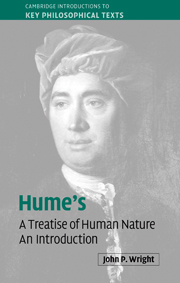Book contents
- Frontmatter
- Contents
- Preface
- Acknowledgments
- List of abbreviations
- 1 The author and the book
- 2 First principles
- 3 Causation
- 4 Skepticism
- 5 Determinism
- 6 Passions, sympathy, and other minds
- 7 Motivation: reason and calm passions
- 8 Moral sense, reason, and moral skepticism
- 9 The foundations of morals
- Bibliography and further reading
- Index
4 - Skepticism
Published online by Cambridge University Press: 05 June 2012
- Frontmatter
- Contents
- Preface
- Acknowledgments
- List of abbreviations
- 1 The author and the book
- 2 First principles
- 3 Causation
- 4 Skepticism
- 5 Determinism
- 6 Passions, sympathy, and other minds
- 7 Motivation: reason and calm passions
- 8 Moral sense, reason, and moral skepticism
- 9 The foundations of morals
- Bibliography and further reading
- Index
Summary
There could not be a greater contrast than that between the optimism which pervades Hume's announcement of his ambitious project of founding all the sciences on that of human nature in the Introduction to the Treatise and the pessimism with which he describes his total skepticism in the Conclusion to Book 1. Here, after running through the “manifold contradictions and imperfections in human reason” he announces that he is “ready to reject all belief and reasoning, and can look upon no opinion even as more probable or likely than another” (T1.4.7.8: 268–9). In this state of total skepticism or doubt, he is stuck in inaction – “utterly deprived of the use of every member and faculty.” He is overwhelmed by “philosophical melancholy and delirium” (T1.4.7.9: 269). His only means of escape is to leave his study and “dine, … play a game of back-gammon, … converse, and … [be] merry with … [his] friends” – where he is forced to believe in the “general maxims of the world” (T1.4.7.10: 269). But he calls his belief in this state an “indolent” or lazy belief, and when he once again remembers his former state he is ready to renounce philosophy entirely and “throw all [his] books and papers into the fire.” For philosophy can provide no remedy either for his “spleen and indolence” (T1.4.7.11: 270).
- Type
- Chapter
- Information
- Hume's 'A Treatise of Human Nature'An Introduction, pp. 129 - 168Publisher: Cambridge University PressPrint publication year: 2009

